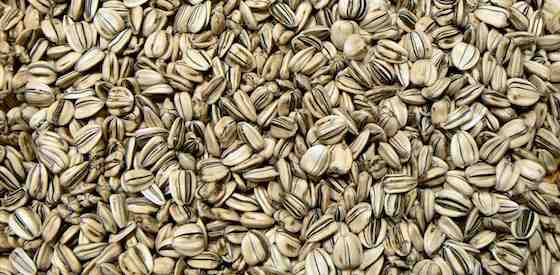- MENU
- HOME
- SEARCH
- WORLD
- MAIN
- AFRICA
- ASIA
- BALKANS
- EUROPE
- LATIN AMERICA
- MIDDLE EAST
- United Kingdom
- United States
- Argentina
- Australia
- Austria
- Benelux
- Brazil
- Canada
- China
- France
- Germany
- Greece
- Hungary
- India
- Indonesia
- Ireland
- Israel
- Italy
- Japan
- Korea
- Mexico
- New Zealand
- Pakistan
- Philippines
- Poland
- Russia
- South Africa
- Spain
- Taiwan
- Turkey
- USA
- BUSINESS
- WEALTH
- STOCKS
- TECH
- HEALTH
- LIFESTYLE
- ENTERTAINMENT
- SPORTS
- RSS
- iHaveNet.com
Lori Zanteson

For thousands of years, Native Americans used sunflower seeds, which originated in Mexico and Peru, for food and oil, and used the plant's roots, stem, and flowers for medicines and dye pigment. One of the first plants cultivated in the U.S., the sunflower provides one of our favorite snacks.
Spiraled artistically inside the large flowering head of the sunflower (Helianthus annus), the many small, tubular flowers become sunflower seeds. Each plant can grow up to twelve feet with a flower diameter of one foot, and produces an average of 800 to 2,000 seeds. Thin shells of black, gray, or gray and white stripes encase gray-green or black seeds. All are edible, though black seeds are generally pressed into sunflower oil, which is rich in linoleic acid. One ounce of seeds has nearly half of the daily requirement for heart healthy vitamin E, as well as rich supplies of fiber, protein, thiamin, niacin, vitamin B6, folate, magnesium, phosphorus, copper, manganese, and selenium.
Vitamin E, an important antioxidant, protects against the oxidation of cholesterol, which can initiate atherosclerosis and lead to blocked arteries, stroke or heart attack. In fact, some studies suggest that this important nutrient may help or prevent the onset of coronary heart disease. But when it comes to vitamin E, evidence suggests that you're better off getting it naturally in foods, such as sunflower seeds, than in supplements. Sunflower seeds are also rich in phytosterols, compounds similar to cholesterol that block the absorption of cholesterol in the intestines. This, according to the
Raw or roasted, shelled or unshelled, the sunflower seed has a huge following of snackers and cooks alike. The freshest, unshelled seeds have firm shells that aren't broken or dirty. Avoid shelled seeds that are yellow or smell "off." High in oil, they are prone to rancidity, so refrigerate or freeze them in an airtight container. An easy and satisfying snack on its own, the mildly nutty sunflower seed partners well with every food group, while kicking up the nutrition. Saute with veggies, sprinkle atop fresh fruit, fold into an omelet, or mix into ground meats, bread and cookie batters.
Notable Nutrients
Sunflower Seed Kernels, dried, 1 ounce (28 g)
Fiber: 2 g (10 percent DV)
Vitamin E: 9.3 mg (47 percent DV)
Thiamin: .4 mg (28 percent DV)
Vitamin B6: .4 mg (19 percent DV)
Magnesium: 91 mg (23 percent DV)
Phosphorus: 185 mg (18 percent DV)
Manganese: .5 mg (27 percent DV)
Selenium: 14.8 mcg (21 percent DV)
DV=Daily Value, g=grams, mg=milligrams, mcg=micrograms